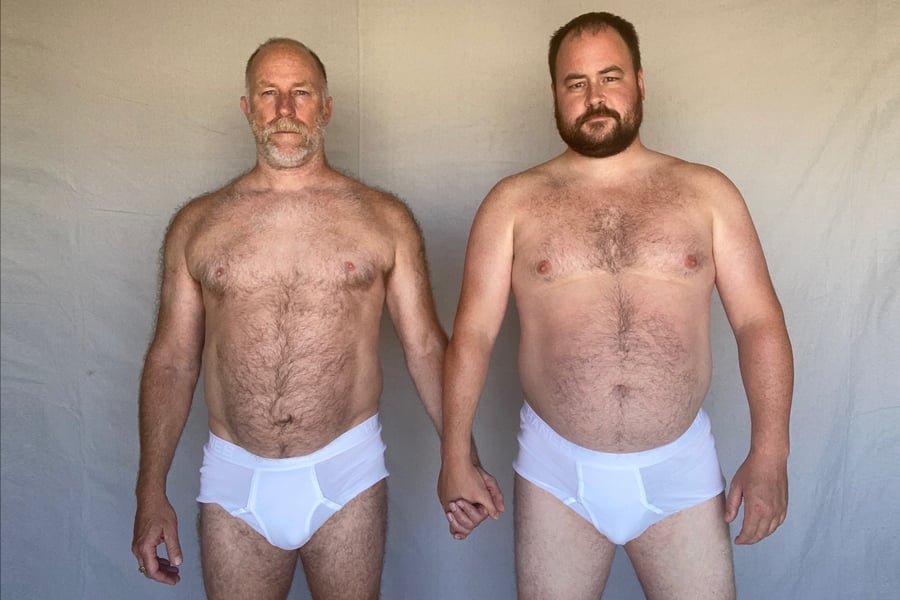Roddy Bottum — the veteran Faith No More keyboardist who has also played with Nastie Band, Imperial Teen, and Crickets — is no stranger to pushing boundaries. He came out publicly in the early Nineties when that sort of brazen honesty could lose friends and any chance of being in a hard rock band. “It felt dangerous then,” he told Out magazine in 2012. “I got a lot of warnings. At the same time, it was exciting to be amid people asking, ‘Are you sure you want to do this? You might lose fans.’ I liked that volatility.”
Now he’s created a new project with his boyfriend, Joey Holman, that may likely invoke its own volatility. MAN ON MAN (he insists on the all-caps) arose from the duo’s need to stay artistically productive while in isolation. The first song, “Daddy,” is simple and sweet, innocent and naughty at the same time and feels closer to a cheeky queercore song one might expect from a band like Pansy Division — with its sex-positive frankness — than the dance-pop that many may stereotypically associate with a “gay track” these days.
“We’re setting out ultimately to document this odd time in the history of the world and to address the importance of creativity and togetherness,” Bottum explains. “The statement of the song and video for ‘Daddy’ maybe is a celebration of love in isolation and is a love letter to the not-so-distant past of a place and time where we communed physically together with our queer community.”
According to Bottum, they’ve already recorded an “album worth of material” and will self-release more singles and videos before a full record is released this summer.
Where are you in quarantine together?
Roddy Bottum: We were in Brooklyn at the onset of the virus and like we say in the song, ‘We took a truck to CAL-I-FOR-NI-A…’ to a sleepy beach town called Oxnard, an hour north of Los Angeles. The drive across the country was intense.
What has “isolation” together been like and why did you decide to produce this album together?
It was apparent that we as artists were on the brink of a new now; a place we’d never been. We started talking about how best to document this chapter in history while staying artistically productive in isolation. Isolation for us has been a time of writing and making art and it brought us a lot closer together. We had a couple guitars and a piano and a keyboard and we wrote and recorded everything in the house we’re staying in. It’s been a window of enlightenment, honestly. It’s rare to have this much time for introspection.
Love the two of you in tighty whitey briefs in the promo photo and the video: What inspired that?
There’s enough representation in the gay community of young, hairless pretty men. It feels good to represent a faction of our culture that isn’t squeaky and manicured. Based on the ageist and homophobic responses posted in the comments section of a straight publication that ran our photo, I’m happy to be those faces on the queer map.
Your band Imperial Teen put out an album earlier this year, and this project with Joey seems more in line with what you’ve been doing with them. How did it come about?
We started brainstorming our project on the drive west. It felt not only important to document the time of the pandemic but to document the way we were feeling about each other and the intensity of our togetherness in isolation. We’d written a little together before but never to this extent. We hadn’t thought a lot about releasing a record and not at all about making a video. The collection of songs kind of warranted that and we just took that leap of faith.
You aren’t shy about mixing something poppy and sexy with a darker side. Is that what you’re going for with “Daddy”?
It’s a real dark time, there’s no denying that, but the vibe between us in the face of this virus is one of positivity, productivity and optimism. The sound of the song and tone of the video came 100% from that place.
I’m not familiar with the alt-Christian band Cool Hand Luke that you used to play in, Joey. What was that like?
Joey Holman: Playing in Cool Hand Luke was an experience that was full of fun and learning, but ultimately I was hiding a very important part of who I was, and that was painful. We had a healthy dose of playing in bars and clubs, but the other half was playing in churches and at Christian music festivals. That was only a little over a decade ago, but there was no room to be honest about who I was, because I knew speaking up for myself would mean the end of my career. The spirit of MAN ON MAN is the total opposite of that — we’re rooted in love, self-expression, and true freedom.



































